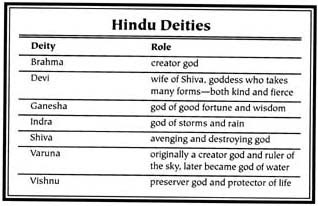Hinduism has no founder or date of origin
The history of Hinduism is unique among the world
religions. Unlike other religious traditions, Hinduism does not originate in a
single founder, a single book or a single point in time. It contains many
different beliefs, philosophies and viewpoints, not always consistent with each
other. The origins and authors of its sacred texts are largely unknown.
Unlike the Greeks and the Egyptians, the ancient
Indian scholars had very little sense of history. Hence they didn’t left any true historical scripts of their
times. The problem is compounded further by followers of different religious
schools who thought, modified and improved the original scripts of their
predecessors, without leaving a trace of their own identities. So for the
earliest periods scholars must rely on educated guesses based on archaeology
and contemporary texts.
Creation of Life as per Hinduism
Was human created by God?. There are many views about creation of Life as per
Hinduism,
One of the script says the universe came into
existence as a result of the sacrifice of a primeval being, Purusha, who
existed even before time. The gods appear to have been his children. Purusha is
dismembered by the gods. Purusha’s mind became the Moon, his eyes the Sun, the
Sky came from his head, and the Earth came from his feet.
Meanwhile, there are
infinite other universes elsewhere, each of them being dreamt by its own god.
Then was not non-existent
nor existent: there was no realm of air, no sky beyond it.
What covered in, and where?
and what gave shelter? Was water there, unfathomed depth of water?
Who verily knows and who
can here declare it, when it was born and when comes this creation?
The Gods are later than
this world's production. Who knows then whence it first came into being?
He, the first origin of
this creation, whether he formed it all or did not form it,
Whose eye controls this
world in highest heaven, he verily knows it, or perhaps he knows not.
Even the gods, even the
Highest Seer in the Highest Sky, could possibly not know it all.
The Hindu insight claims that the Oneness expresses itself in many different forms.
Hinduism is not a religion it is more than that: it
is a vast and complex socio-religious body which, in a way, reflects the
complexity of Indian society. A rich geography, many languages and dialects,
lots of different creeds, racial diversity, all these elements have shaped
Hinduism and made it so heterogenic. The lack of unifying overall religious
authority and the total absence of a book claiming supreme truth and dogmas
have contributed to the diversity of Hinduism as well. It is fair to mention
that even the texts we find in Hinduism that claim some sort of divine
inspiration do not declare their view to be better than any other and they all
exist together in a tolerant fashion. The many manifestations of Hinduism go from
highly intellectual philosophies concerning numerous and puzzling metaphysical
concerns, many rituals, mental and physical exercises such as Yoga to simple,
almost childlike, tales and legends.
 Discussing about God’s of Hinduism, Agni, Indra,
Shiva, Brahma, Vishnu and Ganesha are just a few examples of very important
Hindu gods that were regarded at different times and by different sects as the
most important gods. Shiva, Vishnu and Brahma were part of a holy Hindu trinity
known as Trimurti. Shiva is
sometimes associated with the destruction process and Vishnu as the creator who
takes the remains destroyed by Shiva in order to regenerate what has been
destroyed. Ganesha is the most important deity. Ganesha is highly recognizable
with his elephant head and human body, representing the Atman and the Maya (Soul and Body) respectively.
Discussing about God’s of Hinduism, Agni, Indra,
Shiva, Brahma, Vishnu and Ganesha are just a few examples of very important
Hindu gods that were regarded at different times and by different sects as the
most important gods. Shiva, Vishnu and Brahma were part of a holy Hindu trinity
known as Trimurti. Shiva is
sometimes associated with the destruction process and Vishnu as the creator who
takes the remains destroyed by Shiva in order to regenerate what has been
destroyed. Ganesha is the most important deity. Ganesha is highly recognizable
with his elephant head and human body, representing the Atman and the Maya (Soul and Body) respectively.
In this ever-growing community of endless gods and
goddesses, the roles of the gods and even their hierarchy are somehow diffuse.
Some gods get more attention than others and different accounts suggest
different hierarchies.
Principle of many religions is - “One is better than many: One God, One Book, One Son, One Church, One Nation of God.” In Hinduism, the more the better: many gods, many books, many sages, many insights.









0 Comments